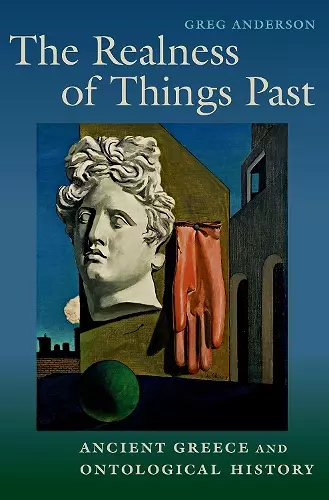The Realness of Things Past
Ancient Greece and Ontological History
Format:Paperback
Publisher:Oxford University Press Inc
Published:3rd Aug '21
Currently unavailable, and unfortunately no date known when it will be back
This paperback is available in another edition too:
- Hardback£96.00(9780190886646)

The Realness of Things Past proposes a new paradigm of historical practice. It questions the way we conventionally historicize the experiences of non-modern peoples, western and non-western, and makes the case for an alternative. It shows how our standard analytical devices impose modern, dualist metaphysical conditions upon all non-modern realities, thereby authorizing us to align those realities with our own modern ontological commitments, fundamentally altering their contents in the process. The net result is a practice that homogenizes the past's many different ways of being human. To produce histories that are more ethically defensible, more philosophically robust, and more historically meaningful, we need to take an ontological turn in our practice. The book works to formulate a non-dualist historicism that will allow readers to analyse each past reality on its own ontological terms, as a more or less autonomous world unto itself. To make the case for this alternative paradigm, the book engages with currents of thought in many different intellectual provinces, from anthropology and postcolonial studies to the sociology of science and quantum physics. And to demonstrate how the new paradigm might work in practice, it uses classical Athens as its primary case study. The Realness of Things Past is divided into three parts. To highlight the limitations of conventional historicist analysis and the need for an alternative, Part I critically scrutinizes our standard modern accounts of "democratic Athens." Part II draws on a wide range of historical, ethnographic, and theoretical literatures to frame ethical and philosophical mandates for the proposed ontological turn. To illustrate the historical benefits of this alternative paradigm, Part III then shows how it allows us to produce an entirely new and more meaningful account of the Athenian politeia or "way of life." The book is expressly written to be accessible to a non-specialist, cross-disciplinary readership.
A very ambitious piece of work. It will attract controversy, but its direction of travel in a world where modern values and concerns are too easily imposed on the ancient is to be applauded. * Classics for All *
Anderson's central claim is persuasive...[His] stark reminder of the ontological unfamiliarity of the premodern world should encourage us not just to be more careful in our assumptions about democracy in the past but perhaps also about democracy in the present. * London Review of Books *
By challenging the idea that Athens was an early version of modern societies, Anderson raises a number of very important issues and rightly challenges a whole nexus of preconceived assumptions; even if one disagrees with some of his answers, this is a thought-provoking book that must be read and engaged with widely. * Kostas Vlassopoulos, University of Crete, Greece & Rome *
Anderson's thorough critique of conventional historicism will be a rewarding read for scholars interested in reflecting on their own historical practice. His radical, often polemical, posture strikes at the root of (western, modern, liberal, materialist) certainty and his approach to the past will lead us to our own "radical alterity" in the present. It is tempting to say that the work is more suitable to specialists and advanced graduate students but that would underestimate the potential for this book to raise important questions for those who continue to be taught the grand narratives of non-modern peoples whose voices we have lost. â the greater strength of this important book is his invitation * and challengeto historians to consider what an ontological turn might look like in our own research. He offers no less than a paradigm shift of seismic proportions with the potential for equally world-shaking results.Mark Roblee, Bryn Mawr Classical Review *
ISBN: 9780197576700
Dimensions: 231mm x 155mm x 23mm
Weight: 499g
338 pages